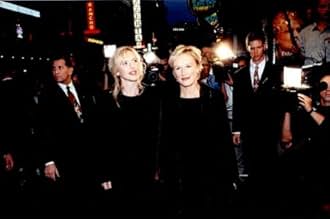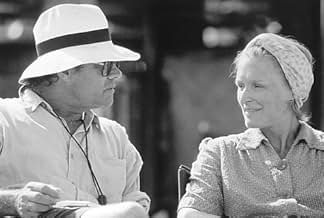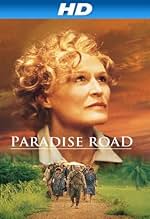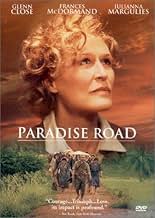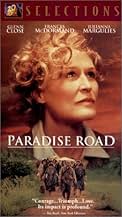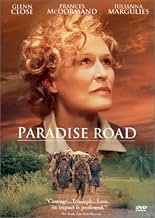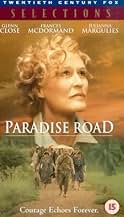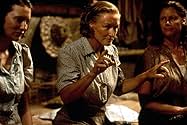AVALIAÇÃO DA IMDb
6,8/10
6,2 mil
SUA AVALIAÇÃO
Adicionar um enredo no seu idiomaA group of women who are imprisoned on the island of Sumatra by the Japanese during World War II use music to relieve their misery.A group of women who are imprisoned on the island of Sumatra by the Japanese during World War II use music to relieve their misery.A group of women who are imprisoned on the island of Sumatra by the Japanese during World War II use music to relieve their misery.
- Direção
- Roteiristas
- Artistas
- Prêmios
- 1 vitória e 7 indicações no total
Johanna ter Steege
- Sister Wilhelminia
- (as Johanna Ter Steege)
Avaliações em destaque
10srne
I stumbled across this movie surfing TV channels late one night. I was drawn right into the plot, and thought it was an incredible story, incredibly well-told. It's a true story, which I previously did not know anything about, but should have. Both the story, itself, and the film, should be much, much better known. It is also one of Glenn Close's best performances. Her performance, and the film, itself, are absoultely gripping! If you like true-life stories that are extremely well-done, such as "We Were Soldiers," then this one is of a similar genre, but with the main characters being women.
Why didn't more people see this film? This is what makes it great:
As an ensemble piece it works wonderfully - the cast are truly magnificent. Glenn Close is fabulous as the 'central' character and most well known 'star', but she does not monopolise all the scenes and screen time. She blends in with what is a wonderful cast, and does so impeccably. Why she hasn't been given more kudos as an actress is beyond me - she is stunning.
The film worked perfectly because of what comes across as a genuine rapport between the female cast. Each actress brings a different element to the story - Jennifer Ehle is strong willed and beautiful, Julianna Marguilles fiesty and dominant, Pauline Collins has such a human quality which she conveys to perfection, Cate Blanchett portrays wonderfully a quiet woman with a rebellious side. All compliment and balance each other. The actresses succeed admirably in bringing to the fore the bond that grew between their real life inspirations for this story.
The direction is precise and the cinematogrpahy beautiful. Despite the bleak context, Japan still looks vibrant and colourful, full of life.
The score. I can't do justice to the score in words - the vocal orchestra formed by the women is just beautiful and poignant to listen to and really does need to be heard to be understood. Somehow the actresses manage to make the music symbolise their humanity and spirit. It works wonderfully.
Overall, this is a heartfelt film with a profound message of hope which runs all the way through it. 'Paradise Road' is one of those rare films which reminds you of the indestructible nature of the human spirit. I wish there were more films like this one, and I wish more people had have seen this film. In a word it's a gem.
As an ensemble piece it works wonderfully - the cast are truly magnificent. Glenn Close is fabulous as the 'central' character and most well known 'star', but she does not monopolise all the scenes and screen time. She blends in with what is a wonderful cast, and does so impeccably. Why she hasn't been given more kudos as an actress is beyond me - she is stunning.
The film worked perfectly because of what comes across as a genuine rapport between the female cast. Each actress brings a different element to the story - Jennifer Ehle is strong willed and beautiful, Julianna Marguilles fiesty and dominant, Pauline Collins has such a human quality which she conveys to perfection, Cate Blanchett portrays wonderfully a quiet woman with a rebellious side. All compliment and balance each other. The actresses succeed admirably in bringing to the fore the bond that grew between their real life inspirations for this story.
The direction is precise and the cinematogrpahy beautiful. Despite the bleak context, Japan still looks vibrant and colourful, full of life.
The score. I can't do justice to the score in words - the vocal orchestra formed by the women is just beautiful and poignant to listen to and really does need to be heard to be understood. Somehow the actresses manage to make the music symbolise their humanity and spirit. It works wonderfully.
Overall, this is a heartfelt film with a profound message of hope which runs all the way through it. 'Paradise Road' is one of those rare films which reminds you of the indestructible nature of the human spirit. I wish there were more films like this one, and I wish more people had have seen this film. In a word it's a gem.
This film gripped me from the opening scene in the hotel ballroom and prooved to be a class act right to the end. Director Bruce Beresford's track record includes Driving Miss Daisy, Tender Mercies and Breaker Morant, so Paradise Road came as a special treat, not realising at the time of viewing that he had directed these films. The realistic scenes of violence had a tremendous impact in contrast to some of the wonderful underplaying of the leading actresses, notably Glenn Close and Pauline Collins. The Japanese actors, although unknown to me were chillingly effective. I can only hope for more films of this calibre but alas they are few and far between.
'Paradise Road' is not the first time the story of European and Australian prisoners of the Japanese during WW2 has been told - there is a famous old movie of Neville Shute's 'A Town Like Alice' and the BBC's wonderful tv series, 'Tenko', from the early 1980s. Nevertheless there is certainly scope for this film, which tells the story of a group of largely upper class women who have to come to terms with captivity and brutality as a 'defeated race' and somehow survive the war. The particular twist to this film is the fact-based story of the choir a group of women started in one camp. In other ways, however, the story is practically identical to 'Tenko', only crammed into around 2 hours instead of 30. This means that the effect is very much like watching one of those Reduced Shakespeare Company shows that do the Complete Works of Shakespeare in one performance. Virtually nothing happens in Paradise Road that doesn't happen in Tenko - fair enough, since it is fact based, but you feel like you're watching whole episodes crammed into a single line and you find yourself desperate for more character development - you never find out, for example, who Glenn Close's character really _is_. Despite this, the acting is top-hole and the script-writing is quite sparky, while production values are for the most part extremely high - this is a very good looking film. And therein lies a problem. While the violence is not sanitised, the starvation is. The women in this film appear to have suffered no more ill effects after 3 years of captivity and hard labour than a healthy sun tan and fetching urchin-style crop. The fight-in-the-shower scene shows us an array of perfect bodies with no sores, sunburn, bruises, skin diseases etc. (Again, Tenko did this much better.) When some of the women are meant to be dying of starvation towards the end the idea that these healthy women are meant to be suffering is so laughable as to be more like amateur dramatics than professional movie making. In failing to give a sense of the struggle to survive that the real women went through, this film diminishes their courage and does not do them justice.
This film is watchable, however, and tells stories that need to be told. Watch it by all means - but 'Tenko' is now out on video, so get that next!
This film is watchable, however, and tells stories that need to be told. Watch it by all means - but 'Tenko' is now out on video, so get that next!
I love this movie because I love the characterization of the women in it. I felt powerfully with the women, felt I knew them, felt complete identification with most of them.
I actually think it's hard to specify the actions and words that will make a character both realistic and sympathetic. Showing mere suffering won't do it. But here, Mr. Beresford has been able to stir such warm feelings (particularly toward the Roberts girl, the Glenn Close and Jennifer Ehle, her Dutch friend, and the Cate Blanchett characters). The romanticism, cheer and background of the Ehle character are particularly well drawn.
This is a far superior movie to 'Platoon', by the way - and a wonderful tribute to those who went through the awful 3.5 year ordeal.
Another thing I quite liked (these days) was to see a movie that did not attempt to make the Caucasians the moral villain relative to the other race depicted.
This is not a movie concerned with p.c. appearances - the Japanese are not shown as somehow merely "different", a difference we "simply cannot understand or judge" because of our different culture. Setting a woman on fire for bargaining for medicine for a sick elderly woman is brutality in any culture - and this movie does not attempt to minimize the moral wrong.
Bravo, Mr. Beresford.
I actually think it's hard to specify the actions and words that will make a character both realistic and sympathetic. Showing mere suffering won't do it. But here, Mr. Beresford has been able to stir such warm feelings (particularly toward the Roberts girl, the Glenn Close and Jennifer Ehle, her Dutch friend, and the Cate Blanchett characters). The romanticism, cheer and background of the Ehle character are particularly well drawn.
This is a far superior movie to 'Platoon', by the way - and a wonderful tribute to those who went through the awful 3.5 year ordeal.
Another thing I quite liked (these days) was to see a movie that did not attempt to make the Caucasians the moral villain relative to the other race depicted.
This is not a movie concerned with p.c. appearances - the Japanese are not shown as somehow merely "different", a difference we "simply cannot understand or judge" because of our different culture. Setting a woman on fire for bargaining for medicine for a sick elderly woman is brutality in any culture - and this movie does not attempt to minimize the moral wrong.
Bravo, Mr. Beresford.
Você sabia?
- CuriosidadesThe music in the film was derived from the actual score transcripts used in the P.O.W camps which survived World War II.
- Erros de gravaçãoThe women of the choir did the singing while sitting down because of having to work in the extreme heat during the day left them exhausted.
- Citações
Adrienne Pargiter: You don't hate them do you?
Margaret Drummond: No.
Adrienne Pargiter: Why not?
Margaret Drummond: I've tried, but I can't bring myself to hate people. The worse they behave, the sorrier I feel for them.
- Trilhas sonorasSymphony No. 9 in E minor Op. 95 'From the New World' II. Largo
Written by Antonín Dvorák (as Antonin Dvorak)
Principais escolhas
Faça login para avaliar e ver a lista de recomendações personalizadas
- How long is Paradise Road?Fornecido pela Alexa
Detalhes
- Data de lançamento
- Países de origem
- Idiomas
- Também conhecido como
- Paradise Road
- Locações de filme
- Empresas de produção
- Consulte mais créditos da empresa na IMDbPro
Bilheteria
- Orçamento
- US$ 16.000.000 (estimativa)
- Faturamento bruto nos EUA e Canadá
- US$ 2.007.100
- Fim de semana de estreia nos EUA e Canadá
- US$ 62.518
- 13 de abr. de 1997
- Faturamento bruto mundial
- US$ 2.007.100
- Tempo de duração
- 2 h 2 min(122 min)
- Cor
- Mixagem de som
- Proporção
- 2.35 : 1
Contribua para esta página
Sugerir uma alteração ou adicionar conteúdo ausente


